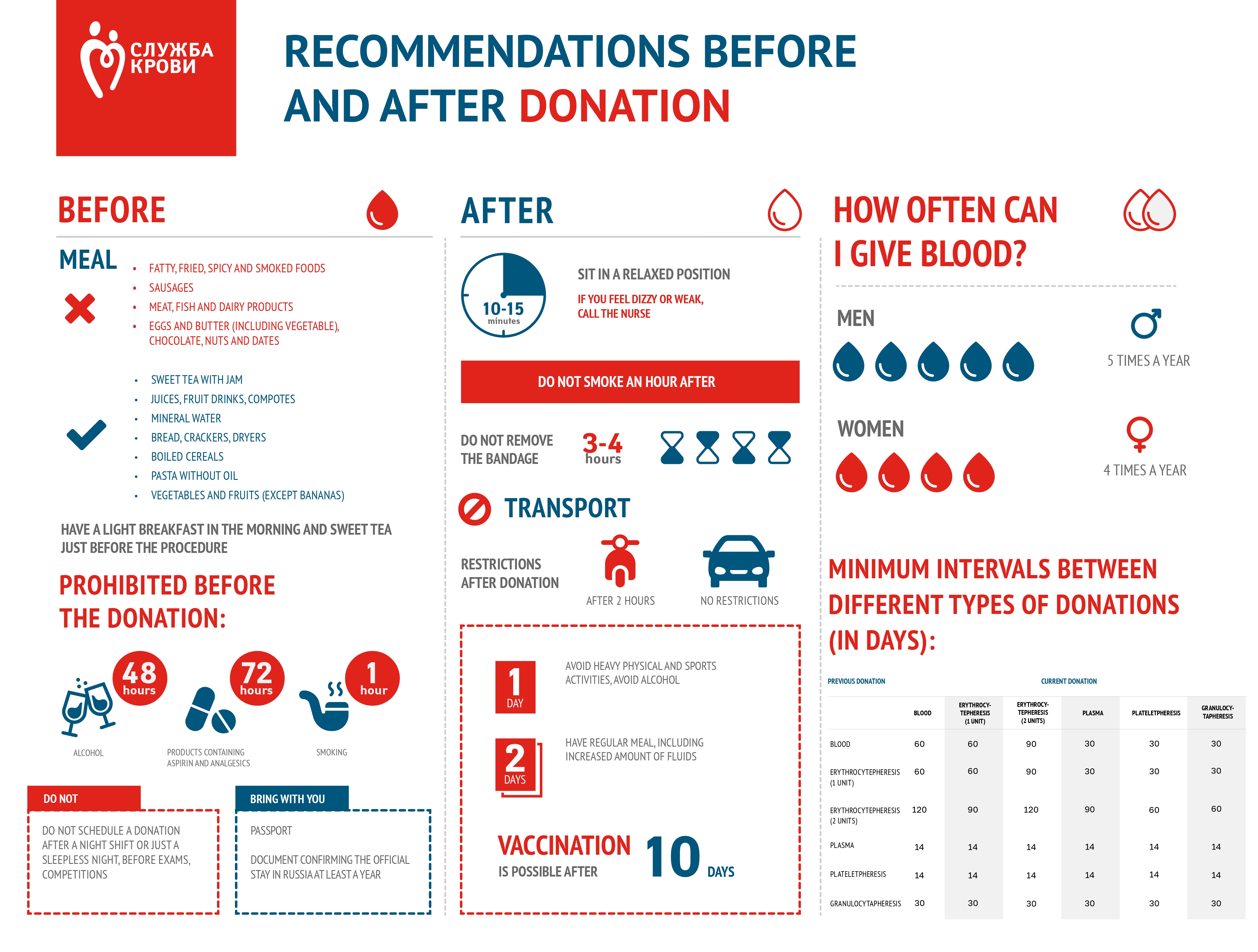Recommendations before and after donation
Before your blood donation:
- On the eve and on the day of blood donation, it is forbidden to have fatty, fried, spicy and smoked foods, sausages, as well as meat, fish and dairy products, eggs and butter (including vegetable), chocolate, nuts and dates, avocados, beets, bananas. You should not donate blood on an empty stomach!
- It is recommended to have tea with jam, juices, fruit drinks, compotes, mineral water and bread, crackers, dryers, boiled cereals, pasta without oil, vegetables and fruits, EXCEPT avocados, beets, bananas.
- No alcohol should be consumed 48 hours prior to the visit to the blood service facility. No products containing aspirin and analgesics should be taken 72 hours before.
- Smoking is prohibited one hour before the donation procedure.
- Doctors have established that the body reacts best to blood loss in the morning hours. The earlier the donation occurs, the easier this procedure is tolerated. After 12:00 it is recommended to donate blood only to regular donors.
- Do not schedule a donation after a night shift or just a sleepless night.
- Don't schedule blood donations right before exams, competitions, project submissions, during a particularly intense work period, etc.
- You must bring your passport.
Following these simple rules is especially important when donating platelets or plasma, as their violation will affect the quality of the prepared blood components.
During blood donation, some people experience dizziness due to a slight decrease in pressure. However, a healthy person easily handle with this.
After donation:
- Sit in a relaxed position for 10-15 minutes after donating blood.
- If you feel dizzy or weak, call the nurse. The easiest way to help yourself is to lie on your back and raise your legs above your head, or sit down and lower your head between your knees.
- Do not smoke one hour after.
- Do not remove the bandage for 3-4 hours, try not to get it wet.
- Avoid this day of heavy physical and sports activities, weight lifting, including heavy shopping bags.
- Have meal fully and regularly within two days after donation and at least two liters of liquid per day: juices, water, tea. Alcohol is not recommended.
- There are no restrictions on driving a car on the day of donation. You can drive a motorcycle 2 hours after.
How often can you donate blood?
For the safety of donation, it is important to follow the rules established by doctors. Men can donate blood not more than 5 times a year, women - not more than 4.
Minimum intervals between different types of donation (in days)
| Previous donation | Current donation | |||||
| blood | erythrocytepheresis (1 unit) |
erythrocytepheresis (2 units) |
plasma | plateletpheresis | granulocytapheresis | |
| Interval in days | ||||||
| Blood | 60 | 60 | 90 | 30 | 30 | 30 |
| erythrocytepheresis (1 unit) | 60 | 60 | 90 | 30 | 30 | 30 |
| erythrocytepheresis (2 units) | 120 | 90 | 120 | 60 | 60 | 60 |
| plasma | 14 | 14 | 14 | 14 | 14 | 14 |
| plateletpheresis | 14 | 14 | 14 | 14 | 14 | 14 |
| granulocytapheresis | 30 | 30 | 30 | 30 | 30 | 60 |
The blood service institution reserves the right to increase these intervals depending on the needs of medical organizations in certain components of donor blood. You can find out about the current need by contacting the blood service institution you are interested in or using the donor traffic light.
Most people know very little about donation and therefore trust the most unreasonable myths...
Donor movement covers all who care about the fate of others, those who...

